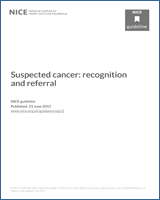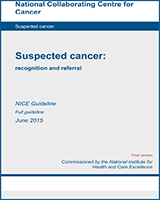NCBI Bookshelf. A service of the National Library of Medicine, National Institutes of Health.
January 2021: NICE amended the recommendation on offering quantitative faecal immunochemical tests (recommendation 1.3.4) in the short version of the guideline to include the full list of criteria for faecal testing. Faecal testing should also be offered to people without rectal bleeding aged 50 or over with unexplained abdominal pain or weight loss, or to adults under 60 with changes in bowel habit or iron-deficiency anaemia. The tables of symptoms and findings in the short version have been updated to match these changes. September 2020: Recommendation 1.3.4 in the short version of this guideline was amended to clarify when to offer faecal testing for colorectal cancer to adults without rectal bleeding. The tables on abdominal and pelvic pain, change in bowel habit and primary care investigations were updated in line with this. The wording in some recommendations was edited to incorporate text previously in footnotes. July 2017: The recommendation on page 138 (recommendation 1.3.4 in the short version of the guideline) has been stood down (this has been greyed out in the pdf) as it has been superseded by newly-published NICE diagnostics guidance. An earlier recommendation was amended to remove a link to the recommendation on page 138. June 2016: Recommendations 1 and 2 in the section on Lower gastrointestinal tract cancers 2 have been changed to say 'adults' instead of 'people' to more accurately reflect the populations they cover in the pdf.
Excerpt
Cancer is an important condition, both in terms of the number of people affected and the impacts on those people and the people close to them. Around one third of a million new cancers are diagnosed annually in the UK, across over 200 different cancer types. Each of these cancer types has different presenting features, though there may be overlap. More than one third of the population will develop a cancer in their lifetime. Although there have been large advances in treatment and survival, with a half of cancer sufferers now living at least ten years after diagnosis, it remains the case that more than a quarter of all people alive now will die of cancer.
It is generally believed that early diagnosis of cancer is beneficial. However, this is quite difficult to prove scientifically, in part because the natural course of cancer, and of its symptoms, is imperfectly understood. The benefit from earlier diagnosis is usually thought of in terms of survival - with most people considering the chance of surviving their cancer to be higher the earlier it is diagnosed, as the cancer will have had less time to spread. There may be other benefits from expediting diagnosis, such as relief of symptoms. These factors have underpinned many initiatives in the UK and other countries aimed at improving cancer diagnosis. These include awareness campaigns, cancer screening, and better diagnosis of symptomatic cancer. There is also unwarranted variation in referral rates, investigation rates and clinical outcomes. This guideline, on the symptoms of possible cancer, seeks to improve cancer diagnosis.
This guideline is about people with symptoms, rather than about people in whom cancer is already suspected. It is increasingly recognised that selection of patients whose symptoms suggest cancer should be considered a primary care task, as the large majority of such patients present to a primary care clinician. As consideration of possible cancer typically occurs in primary care, evidence from primary care must inform the identification process. Previous approaches have relied mostly on evidence from secondary care, partly because evidence from primary care was lacking. More primary care evidence is now available.
Contents
- Methodology
- 1. Introduction
- The guiding principle of risk
- At what value should the risk threshold be?
- Symptoms present in multiple cancers but of low risk for each cancer site
- What is expected in primary care before these recommendations operate?
- Actions in primary care
- The use of risk factors as well as symptoms
- What these recommendations are and what they are not
- 2. Definitions
- 3. Research recommendations
- 4. Patient information and support
- 5. Safety netting
- 6. The diagnostic process
- 7. Lung and pleural cancers
- 8. Upper gastro-intestinal tract cancers
- 9. Lower gastrointestinal tract cancers
- 10. Breast cancer
- 11. Gynaecological cancers
- 12. Urological cancers
- 13. Skin cancers
- 14. Head and neck cancers
- 15. Brain and central nervous system cancers
- 16. Haematological cancers
- 17. Sarcomas
- 18. Childhood cancers
- 19. Non-site-specific symptoms
- 20. Recommendations for specific symptoms and signs
- Appendices
- Appendix A. The cost-effectiveness of diagnostic tests to diagnose colorectal cancer for patients aged 40 years and over with a change in bowel habit in primary care
- Appendix B. Abbreviations
- Appendix C. Glossary
- Appendix D. Guideline Scope
- Appendix E. People and organisations involved in production of the guideline
- Appendix F. Evidence review
- Appendix G. Search strategies for Suspected Cancer update 2015
- Appendix H. Review protocols for Suspected Cancer update 2015
- Appendix I. Health economics excluded papers list
- Appendix J. Text deleted from CG27
This guidance updates and replaces NICE guideline CG27 (published June, 2005).
New and updated recommendations have been included on the recognition, management and referral of suspected cancer in children, young people and adults in primary care.
Recommendations have also been incorporated from the NICE guideline on ovarian cancer (published 2011).
Recommendations are marked to indicate the year of the last evidence review:
- [2005] [2011] if the evidence has not been reviewed since the original guideline.
- [2015] if the evidence has been reviewed but no change has been made to the recommendation.
- [new 2015] if the evidence has been reviewed and the recommendation has been updated or added.
Appendix J4 contains recommendations from the 2005 guideline that have been deleted from this 2015 update. Details of any replacement recommendations are also included.
Disclaimer: Healthcare professionals are expected to take NICE clinical guidelines fully into account when exercising their clinical judgement. However, the guidance does not override the responsibility of healthcare professionals to make decisions appropriate to the circumstances of each patient, in consultation with the patient and/or their guardian or carer.
- Review Tuberculosis.[Major Infectious Diseases. 2017]Review Tuberculosis.Bloom BR, Atun R, Cohen T, Dye C, Fraser H, Gomez GB, Knight G, Murray M, Nardell E, Rubin E, et al. Major Infectious Diseases. 2017 Nov 3
- Review Peripheral Arterial Disease – Diagnosis and Treatment: A Systematic Review[ 2008]Review Peripheral Arterial Disease – Diagnosis and Treatment: A Systematic ReviewSwedish Council on Health Technology Assessment. 2008 Nov
- Palliative care experiences of adult cancer patients from ethnocultural groups: a qualitative systematic review protocol.[JBI Database System Rev Implem...]Palliative care experiences of adult cancer patients from ethnocultural groups: a qualitative systematic review protocol.Busolo D, Woodgate R. JBI Database System Rev Implement Rep. 2015 Jan; 13(1):99-111.
- Review Dementia -- Caring, Ethics, Ethnical and Economical Aspects: A Systematic Review[ 2008]Review Dementia -- Caring, Ethics, Ethnical and Economical Aspects: A Systematic ReviewSwedish Council on Health Technology Assessment. 2008 Jun
- Italian cancer figures, report 2014: Prevalence and cure of cancer in Italy.[Epidemiol Prev. 2014]Italian cancer figures, report 2014: Prevalence and cure of cancer in Italy.AIRTUM Working Group. Epidemiol Prev. 2014 Nov-Dec; 38(6 Suppl 1):1-122.
- Suspected CancerSuspected Cancer
Your browsing activity is empty.
Activity recording is turned off.
See more...

